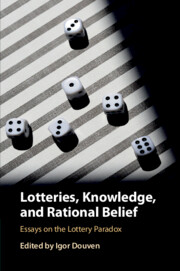Book contents
- Lotteries, Knowledge, and Rational Belief
- Lotteries, Knowledge, and Rational Belief
- Copyright page
- Contents
- Contributors
- Introduction
- Chapter 1 Rational Belief and Statistical Evidence
- Chapter 2 Knowledge Attributions and Lottery Cases
- Chapter 3 The Psychological Dimension of the Lottery Paradox
- Chapter 4 Three Puzzles about Lotteries
- Chapter 5 Four Arguments for Denying that Lottery Beliefs Are Justified
- Chapter 6 Rethinking the Lottery Paradox
- Chapter 7 Rational Belief in Lottery- and Preface-Situations
- Chapter 8 Stability and the Lottery Paradox
- Chapter 9 The Lottery, the Preface, and Epistemic Rule Consequentialism
- Chapter 10 Beliefs, Probabilities, and Their Coherent Correspondence
- Chapter 11 The Relation between Degrees of Belief and Binary Beliefs
- Bibliography
- Index
Chapter 7 - Rational Belief in Lottery- and Preface-Situations
Impossibility Results and Possible Solutions
Published online by Cambridge University Press: 29 January 2021
- Lotteries, Knowledge, and Rational Belief
- Lotteries, Knowledge, and Rational Belief
- Copyright page
- Contents
- Contributors
- Introduction
- Chapter 1 Rational Belief and Statistical Evidence
- Chapter 2 Knowledge Attributions and Lottery Cases
- Chapter 3 The Psychological Dimension of the Lottery Paradox
- Chapter 4 Three Puzzles about Lotteries
- Chapter 5 Four Arguments for Denying that Lottery Beliefs Are Justified
- Chapter 6 Rethinking the Lottery Paradox
- Chapter 7 Rational Belief in Lottery- and Preface-Situations
- Chapter 8 Stability and the Lottery Paradox
- Chapter 9 The Lottery, the Preface, and Epistemic Rule Consequentialism
- Chapter 10 Beliefs, Probabilities, and Their Coherent Correspondence
- Chapter 11 The Relation between Degrees of Belief and Binary Beliefs
- Bibliography
- Index
Summary
Rational agents represent their beliefs about the world in two rather different ways. One way is by means of qualitative beliefs, or yes-or-no beliefs: Here a proposition p is either believed, or disbelieved (i.e., ¬p is believed), or belief about p is suspended. Thereby, with “rational belief that p” it is meant that the proposition p is believed to be true, or accepted as being true, whereby the system of beliefs satisfies certain rationality conditions.
- Type
- Chapter
- Information
- Lotteries, Knowledge, and Rational BeliefEssays on the Lottery Paradox, pp. 128 - 146Publisher: Cambridge University PressPrint publication year: 2021
- 3
- Cited by

